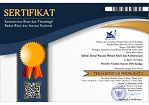The influence of sunni islamic values on rehabilitation as judicial decision for minor drug users in Indonesian court
Abstract
This article illustrates how recent research uses qualitative semi- structured interviews to understand judicial perceptions when convicting minor drug offenders. To develop an understanding of what the judges were trying to achieve when convicting drug offenders, I interviewed 31 judges. This article contributes to the sociol-legal understanding of the context in which problem- solving and justice influenced by Islamic religious values work in harmony. Indonesian judges use Islamic values to support rehabilitation. This supportive approach opens the door to the influence of Sunni Islamic values as one of the legitimating values when deciding.
Keywords
Full Text:
PDFReferences
Ashworth, A. European sentencing traditions: accepting divergence or aiming for convergence? In: C. Tata and N. Hutton eds. Sentencing and society: international perspectives. Farnham: Ashgate Publishing, pp. 219-236. (2002)
Biland, É and Steinmetz, H. The judiciary and the boundaries of street level bureaucracy: family judges in France and Canada. Glasgow. ECPR General Conference. (2014)
Davis, N. J., & Robinson, R. V. The egalitarian face of Islamic orthodoxy: support for Islamic law and economic justice in seven Muslim-majority nations. American Sociological Review, 71(2), pp.167-190. https://doi.org/10.1177/000312240607100201. (2006).
Duff, R.A. Punishment, communication, and community. Oxford: Oxford University Press. (2001)
Duff, R.A. and Garland, D. A reader on punishment. Oxford: Oxford University Press. (1994)
Duff, R.A. and Garland, D. Sociological perspectives on punishment. Oxford: Oxford University Press. (1994)
Fox, J. Currents in contemporary Islam in Indonesia. Canberra: Australian National University. (2004). Available: https://openresearch-repository.anu.edu.au/bitstream/1885/42039/2/Islam_in_Indonesia2.pdf [Accessed 24 February 2018].
Goffman, E. The presentation of self in everyday life. Garden City, NY: Anchor. (1959).
Hart, H.L.A. and Green, L. The concept of law. Oxford: Oxford University Press. (2012). https://doi.org/10.1093/he/9780199644704.001.0001
Helms, R., Modelling the politics of punishment: a conceptual and empirical analysis of ‘law in action’ in criminal sentencing. Journal of Criminal Justice, 37(1), pp.10-20. 2009.
https://doi.org/10.1016/j.jcrimjus.2008.12.004
Hutton, N. Sentencing as a social practice. In: S. Armstrong and L. McAra eds. Perspectives on punishment: the contours of control, Oxford: Oxford University Press, pp.155-174. (2006)
Lipsky, M. Street-level bureaucracy: dilemmas of the individual in public service. 30th Anniversary ed. New York: Russell Sage Foundation. (2010)
Klein, D.E. and Mitchell, G. The psychology of judicial decision making. Oxford: Oxford University Press. (2010)
https://doi.org/10.1093/acprof:oso/9780195367584.001.0001
Kramer, J.H. and Ulmer, J.T. Sentencing guidelines: lessons from Pennsylvania. Boulder., Lynne Reiner Publishers. (2009)
Mustafa, C. " Punishment, in fact, did not resolve the problem": The judicial perspectives on the sentencing of minor drug offenders in Indonesia. In Papers from the British Criminology Conference (Vol. 16, pp. 93-110). British Society of Criminology. (2018).
Mustafa, C. The perceptions of Indonesian judges in sentencing minor drug offenders: challenges and opportunities. Jurnal Hukum dan Peradilan [Journal of Law and Court Justice], 9(1), 1-26. (2020). https://doi.org/10.25216/JHP.9.1.2020.1-26
Mustafa, C. Judicial Perspectives on the Sentencing of Minor Drug Offenders in Indonesia: Discretionary practice and compassionate approaches. Crime, Law and Social Change. (2020). https://doi.org/10.1007/s10611-020-09896-0
Madkur, M. S. Manahijal-Ijtihad fial-Islam [The Methodology of Legal Reasoning in Islam], al-Matba'ah al-'Ashriyah al-Kuwait. (1974).
Pompe, S. The Indonesian Supreme Court: a study of institutional collapse. Ithaca, NY: Cornell University Press. (2005)
Nolan, J.L. Reinventing justice: the American drug court movement. Princeton, NJ: Princeton University Press. (2001)
Thomas, D. Judicial discretion in sentencing. In: L. Gelsthorpe and N. Padfield eds. Exercising discretion: decision making in the criminal justice system and beyond. London: Willan pp.50-73. (2003)
Ulmer, J.T. Eisenstein, J. and Johnson, B.D. Trial penalties in federal sentencing: extra‐guidelines factors and district variation. Justice Quarterly, 27(4), pp.560-592. (2010) https://doi.org/10.1080/07418820902998063
Ulmer, J.T. and Bradley, M.S. Variation in trial penalties among serious violent offenses. Criminology, 44(3), pp.631-670. (2006) https://doi.org/10.1111/j.1745-9125.2006.00059.x
Ulmer, J.T. Bader, C. and Gault, M. Do moral communities play a role in criminal sentencing? evidence from Pennsylvania. The Sociological Quarterly, 49(4), pp.737-768. (2008) https://doi.org/10.1111/j.1533-8525.2008.00134.x
DOI: https://doi.org/10.18326/ijtihad.v20i1.79-96
Refbacks
- There are currently no refbacks.

This work is licensed under a Creative Commons Attribution-ShareAlike 4.0 International License.
Ijtihad: Jurnal Wacana Hukum Islam dan Kemanusiaan by http://ijtihad.iainsalatiga.ac.id/ is licensed under a Creative Commons Attribution-ShareAlike 4.0 International License







